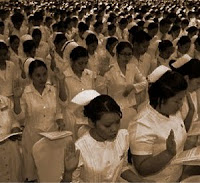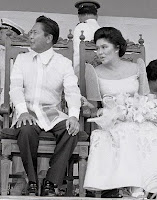Japan after the earthquake: no need for our prayers
 I keep reading about people encouraging one another to "pray" for Japan in this time of great tragedy after a massive earthquake and accompanying tsunami devastated its coastline and killed hundreds of her people. I'm not quite sure Japan needs our prayers. Japan is regarded as the country in the highest state of constant preparedness for earthquakes. As such, the disastrous earthquake that struck Japan is a tragedy, but one that is not tragic in the sense of it being a preventable loss of life.
I keep reading about people encouraging one another to "pray" for Japan in this time of great tragedy after a massive earthquake and accompanying tsunami devastated its coastline and killed hundreds of her people. I'm not quite sure Japan needs our prayers. Japan is regarded as the country in the highest state of constant preparedness for earthquakes. As such, the disastrous earthquake that struck Japan is a tragedy, but one that is not tragic in the sense of it being a preventable loss of life.To me, the stoicism and quiet grace with which the Japanese greeted the unimaginable destruction and loss of life, mobilised its forces to assess and respond, and reached out to the global community to receive assistance speaks volumes of the magnificence of Japanese society. Japan's prayers are different from our prayers. Being a predominantly Shinto and Buddhist society, Japanese prayers generally express a profound respect for nature and an acute mindfulness for one's surroundings. Emphasis is on a life led in harmony with nature and recognition that one is but a part in a vast ecosystem.
In contrast, Catholics see nature as subject to man, and man subject to the "mysterious" whims of their wrathful and all-controlling God. As such, a Catholic's prayers put emphasis on their subjection to the will of God (to explain adversity) and their being showered with his graces (to explain good times). For Catholic Filipinos, prayer is surrender, while for the Japanese, prayer is expressed as reverence for a system of which one is a part. A Catholic's prayer is about deliverance from the physical world, while that of the average Japanese is about embrace of the physical world.
Thus, the Japanese have already said their prayers for those who lost their lives and were severely impact by the earthquake. But unlike ours that are uttered after the fact of a tragedy, the Japanese people pray before the fact. The vast and carefully thought-out measures they had put in place to anticipate and mitigate the risk of a disaster such as the one we are seeing today, is Japan's prayer for its dead and suffering today. Such a sort of prayer, in my opinion, is far superior to the Catholic's prayer. Being done before the fact, it frees minds to focus on acting with clarity of purpose when adversity strikes, rather than imprisoning minds with questions about and surrender to a god's "purpose" as the case would be for after the fact prayers.
While the loss of life in Japan in the aftermath of this year's monster earthquake is staggering, it cannot be said to be one that resulted from any form of reckless neglect. Because the Japanese had done all it can in life to respect the living it has little need for prayers -- only a focus on action and learning and the tangible support coming from nations that are, themselves, possessing of characters consistent with an ethic underpinned by respect for human dignity.
Perhaps Filipinos should instead reserve their "prayers" for their compatriots who remain victims of a long tradition of a lack of inclination to anticipate, prepare for, and mitigate against what the physical world can often unexpectedly spring upon the living.



I have to admit, we, Filipinos, lack even a single form of preparedness for the unexpected because, as we all witnessed everyday on Philippine media, we all focus on anything irrelevant for our country's future.
ReplyDeleteAs an upcoming fourth year HS student now living in Naga City, and about to leave for Singapore for my Summer vacation, I'm very much disappointed about what really transpired here in the Philippines since 1986 and after Noy sat on the throne last year.
ReplyDeleteat the end of the day, it is prayers that all people can hold on to would it be budhist, christian, hindu or muslim. who cares what you think? you get real! man, prayers might not help, but you are and your selfish ideas does'nt help either..
ReplyDeletei agree on most of the topics you have written in this column, but damn you! we maybe hopeless and helpless filipinos, but at least we pray and eases all the pains ang sufferings we have,tang ina, you dont want to pray? dont pray, but dont speak for the japanese people and tell the whole world they dont need it, coz prayers is for every one...
then we wait for the aids and financial help from US...
DeletePag uutak mo kasing liit ng ipis!kaya hindi umuunlad bansa mo dahil sa kadadasal mo!di ka naman pinakikinggan! Wow! Bastos ng bunganga mo,nagmura kapa! Para kang yung mga looters sa tacloban na pati appliances ay ninakaw pa! Astig pinoy daw!pwe!
DeleteJust because pain is eased does not mean the cause of the pain goes. So in that sense, prayer is no more than an opiate and far from being the cure for a condition that consistently causes pain.
ReplyDeleteIronic. You ask me not to "speak for the Japanese" and then here you are making a presumptuous assumption that "prayers is for every one".
Quite an interesting view. Although I feel it's quite a stretch and inadvertently funny to relate disaster preparedness to prayers. For me the lack of disaster preparedness in the Philippines is not at all related to the religiosity of the Filipinos. Simply put it's just a lack of of foresight and prioritization by our corrupt and inept leaders. At the same time I don't think it was the Japanese way of doing their prayers that made them think of building earthquake proof buildings.
ReplyDeleteKind of weird for me to compare the manner of praying of one religion to another. They have different ways of doing it as well as it's purpose. Effectiveness on the other hand would be quite difficult to measure.
I think that when Filipinos offer prayers for say Japan who has experienced this disaster, they obviously do this to show empathy and concern.
I am very much for this website and I know that sometimes in frustration we tend to be too cynical about certain things. But if we are to rebuild the Philippines, religious tolerance and respect to one's beliefs would definitely be one of the things that should be preserved. I think comparing a religion's prayer to another just promotes divisiveness.
As a whole though, I think a lot of religions in the world though should make reforms in their teachings to tailor it to the modern world.
But whatever your religion is, prayers with good thoughts and intentions can't hurt in my opinion.
In the end, I think that some Filipinos have forgotten the old salawikain - "Nasa Diyos ang awa, nasa tao ang gawa.".
It's just a discourse device I used when I likened the Japanese people's relentless efforts to achieve preparedness perfection to prayer. Of course no Japanese person would consciously think of such an undertaking as "prayer". I use this metaphor to make a point -- that while Filipinos spend most of their energy muddling through life on a wing and a prayer, there are people like, say, the Japanese, who focus on taking control of their fortunes. Filipinos rely on prayer to deal with life's challenges, the Japanese rely on hard work and thinking things through to do the same. In a sense relying on hard work and thinking things through are to the Japanese what prayer is to Filipinos. These virtues are the Japanese people's "prayer", so to speak.
ReplyDeleteI get your point benign0. I just thought that it this article was a bit of a stretch. I am still looking forward to more GetRealPhilippines articles.
ReplyDeleteAnyway, this could be totally unrelated but I'm currently viewing the documentary "The Cove" and I guess this documentary shows that not all Japanese people have respect for nature.
there are those who pray this way: i've done the most i can to do things the good and right way so now i leave the rest to the wisdom of higher powers. and then there are those who pray: i ask god to pity me and save my ass for i've been sinful and neglectful of doing what is good and right. when the latter is frequently invoked, prayer is reduced to a childish and silly act.
ReplyDeleteKeep those fresh perspectives coming. When prayer is used to avoid personal responsibility, it is like trying to play a trick on God.
ReplyDeletevery true. we should learn from them.
ReplyDeleteb: "Thus, the Japanese have already said their prayers for those who lost their lives and were severely impact by the earthquake. But unlike ours that are uttered after the fact of a tragedy, the Japanese people pray before the fact."
ReplyDeleteIt seems the above thoughts are contradicting. Some people, which includes me, likewise offered a short prayer for the Japan's earthquake victim. Nothing in my mind that there's no need for it as you've remarked.
BTW, both The Lord's Prayer and Ave Maria (Hail Mary) are before the fact.
To be fair, I generalise (which is as much as a pundit writing about Pinoy society can do given a society of 100 million).
ReplyDeleteSo the active ingredient in this thought process is the collective spirit underlying the general flavour of Pinoy prayer. What is the "spirit" behind the typical Catholic Pinoy prayer? Perhaps those of us who apply a more sophisticated, well-rounded, and broadly-informed mind to religion get it. But consider the rest who see prayer as a kind of an abracadabra invoked against the evil spirits that bring doom and gloom to their lives. These are the people who -- by sheer force of their enormous numbers -- define the collective character of Da Pinoy.
The Japanese are already praying to their Shinto Gods...
ReplyDeleteI love your views but I might disagree with you on this one.
ReplyDeleteNot praying for them because our views as Catholic and theirs as Shinto and Buddhists are different? Not including them while we pray for our compatriots? Buddhists pray before a tragedy and Catholics pray after a tragedy?? And as Catholics, we cant pray for the welfare of Buddhists??
These questions sound absurd but I think these were your talking points in your article.
Sorry, I don't think I stated anywhere in my article any assertion that any prayers be made or not be made for Japan on the basis of what our religion is vis-a-vis theirs.
ReplyDeleteI respect your opinion, but the phrase "no need for our prayers" is so eerie. I hope you will never be in a situation that you will need others to pray for you.
ReplyDeleteis there such a thing as "catholic prayers"? im just curious about ur article..what makes catholic God different from other god from other religion?
ReplyDelete